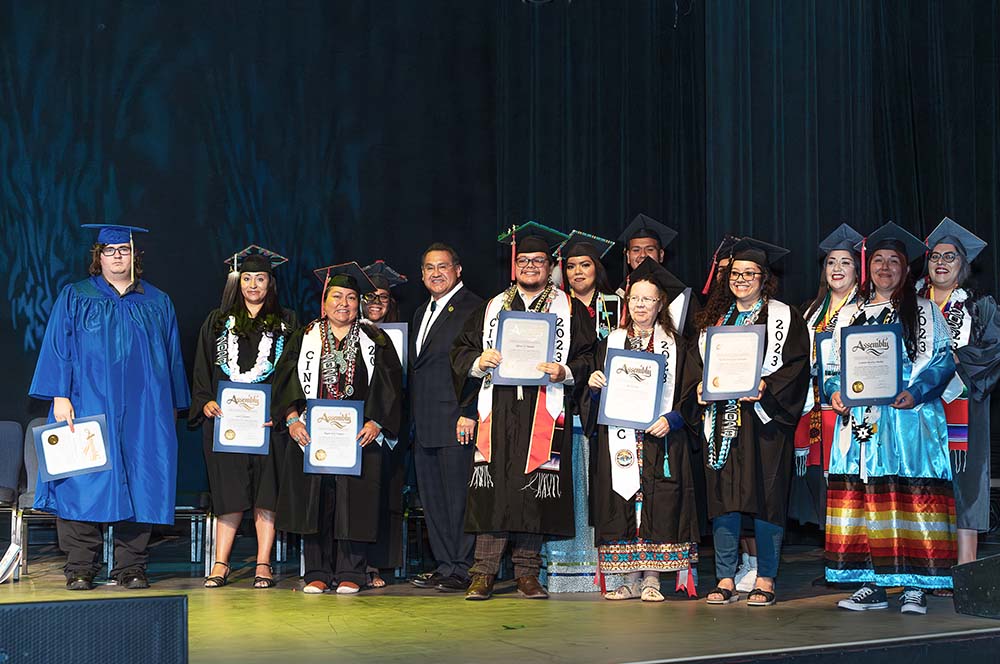
- Details
- By California Indian Nations College
California Indian Nations College (CINC) was accepted as an Associate Member of the American Indian Higher Education Consortium (AIHEC) on February 13, 2024. Situated in Palm Desert, CINC is an emerging tribal college in the ancestral lands of the Cahuilla tribes. Chartered in 2017 with the Twenty-Nine Palms Band of Mission Indians, CINC stands out for its commitment to offering culturally responsive academic curriculum and providing personalized services that empower Native & non-Native students to advance Native American cultures, local communities, and the global community.
According to the 2020 U.S. Census, California has largest Native population in the nation with, 1.4 million people who identify as full or partially American Indian or Alaskan Native, yet the state only has three tribal colleges in the state. The Postsecondary National Policy Institute (2022) reported that American Indian students comprised 0.06% of all post-secondary enrollment, with 83% of those individuals attending public institutions, experiencing higher dropout rates than the general US population. In contrast, American Indian students attending Tribal Colleges or Universities (TCUs) are four times more likely to receive a bachelor's degree than those who enroll in mainstream universities.
“Tribal Colleges and Universities are unique higher education institutions serving the first nations of this country. AIHEC is proud to welcome CINC as an associate member as they vie for accreditation. They have done a lot of hard work, and we are here to support them as they continue the journey toward accreditation,” said AIHEC Interim President & CEO (Chief Executive Officer) Dr. John Phillips.
The state has not had an accredited tribal college since D-Q University, one of AIHEC’s founding members. CINC is poised to change that. CINC is in the second phase of three phases of its accreditation process to eventually join the ranks of the 35 Tribal Colleges and Universities (TCUs) across the nation. Notably, CINC will be the first fully accredited tribal college in California in decades. The AIHEC Board of Directors voted unanimously to add CINC as a new associate member during their Fall board meeting, recognizing the significance of this achievement alongside the Accrediting Commission for Community and Junior Colleges’ (ACCJC) pre-accreditation.
President Celeste Townsend, tribal citizen of the Gidutikad Paiute Band of Fort Bidwell Indian Community & Shoshone-Paiute Tribe of the Duck Valley Reservation, expressed CINC's deep honor in successfully attaining the status of Associate Member within AIHEC, stating, “This momentous achievement marks a historic milestone for California Indian Nations College and for tribal citizens residing in California seeking higher education. This membership underscores AIHEC's endorsement of CINC's mission to offer culturally responsive curriculum rooted in Native American values with personalized support and services advancing the success of Native and non-Native students.”
California Indian Nations College, in collaboration with Kumeyaay Community College and the White House Initiative on Advancing Educational Equity, Excellence, and Economic Opportunity for Native Americans and Strengthening Tribal Colleges and Universities, is hosting its inaugural Native American & Indigenous Education Summit on March 22 & 23. Visit CINC’s website at https://cincollege.org/ for more information.
These stories must be heard.
This May, we are highlighting our coverage of Indian boarding schools and their generational impact on Native families and Native communities. Giving survivors of boarding schools and their descendants the opportunity to share their stories is an important step toward healing — not just because they are speaking, but because they are being heard. Their stories must be heard. Help our efforts to make sure Native stories and Native voices are heard in 2024. Please consider a recurring donation to help fund our ongoing coverage of Indian boarding schools. Donate to Native News Online today and support independent Indigenous-centered journalism. Thank you.
